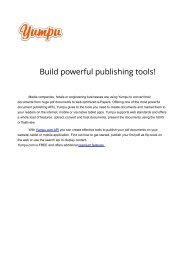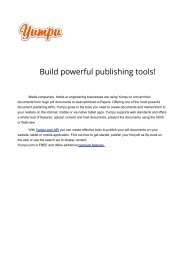test_pdf.pdf
Create successful ePaper yourself
Turn your PDF publications into a flip-book with our unique Google optimized e-Paper software.
ADDRESSING<br />
FUTURE<br />
ARMS<br />
CONTROL<br />
AND SECURITY<br />
PROBLEMS<br />
facility. There’s not, by the way, very much highly enriched uranium there so let’s not get too excited about that<br />
particular reactor. But at a lot of others there are. In Libya, there is a Soviet-supplied research reactor with enough<br />
essentially fresh highly enriched uranium for a bomb sitting at their facility. It’s my understanding that material<br />
is going to be removed as part of the deal with Libya.<br />
There are issues around the world. Pakistan remains a very high concern from my perspective, not because<br />
security is low. We believe that there is pretty heavy guards for that stockpile, but because the threat is extraordinarily<br />
high. Both the insider threat, as is now unfolding in our newspapers on an essentially daily basis, the<br />
degree to which insiders in their nuclear establishment have been, either for personal gain or for Islamic fervor, or<br />
the combination, spreading this kind of technology. But also the outsider threat, since you have heavily armed<br />
remnants of al Qaeda. If you’re going to have 41 heavily armed guys attacking the middle of Moscow, imagine<br />
how many people might attack without warning at a Pakistani nuclear weapons storage facility.<br />
So do terrorists want nuclear weapons? Yes. Bin Laden has said so. The Chechens are carrying out these<br />
reconnaissance at nuclear warhead storage sites. Is it conceivable they could make a crude bomb? Yes, as Senator<br />
Biden said. Is there material that might be vulnerable to them? Yes. Is it likely that if they had a crude device they<br />
could smuggle it into Moscow or into Washington or into New York? Yes, unfortunately so.<br />
We did a study that came out a year ago, which was available out on the table. I gather all of them are gone<br />
now. It’s available on the Worldwide Web at the Nuclear Threat Initiative’s Web site—it’s Controlling Nuclear<br />
Warheads and Materials: A Report Card and Action Plan. We looked at the terrorist pathway to the bomb. We tried to<br />
lay out the steps terrorists would have to take to get from first deciding to pursue nuclear violence to actually<br />
detonating a weapon in the United States, and then the various things the government might be able to do to<br />
address those, ranging from threat reduction to the global war on terrorism to homeland security.<br />
The bottom line is that the weak point for the terrorists, the hard point for the terrorists, and the most costeffective<br />
place for us to act is in securing this material in the first place. Once it gets out of wherever it’s supposed<br />
to be, finding it and getting it back again, or stopping it from coming into our country becomes a very, very difficult<br />
problem. So as Senator Biden was saying, the fundamental issue is we’ve got to lock down every nuclear weapon,<br />
every kilogram of nuclear material that could be used to make a nuclear weapon wherever it is. Much has been<br />
done to do that over the last decade or so. The Russians were taking quite a number of steps themselves, although<br />
generally in their case it’s been add more guards. Add more guards is good if the outsider threat is the main threat.<br />
If the insider threat, somebody carrying something out in their briefcase, is the main threat than whether there is<br />
one guy saying, “have a good weekend” to Ivan as he’s walking out, or whether there’s five guys saying that, it<br />
really doesn’t make any difference.<br />
U.S.-Russian cooperation has improved security for hundreds of tons of nuclear material and thousands of<br />
nuclear warheads at dozens of sites. Enough bomb material for thousands of nuclear weapons has been permanently<br />
destroyed. Many of you may not know that half of all the fuel we use in our nuclear reactors in this country<br />
today comes from dismantled Russian nuclear weapons. They dismantled the weapons, they take the highly<br />
enriched uranium from the weapon, they blend it to low enriched uranium that can never be used in a nuclear<br />
bomb again. They ship it over here and we use it as fuel in our nuclear reactors, and it’s all done on a more or less<br />
commercial basis so it basically doesn’t cost the taxpayer anything. It’s quite an amazing accomplishment, but we<br />
ought to be doing it faster.<br />
We’ve also removed, with the Russians, and with the IAEA some nuclear material from some particularly<br />
vulnerable sites. A lot of people have worked hard. But the reality is that much more remains to be done than has<br />
been done so far. As of the end of last fiscal year, only 23 percent of the potentially vulnerable nuclear weapons<br />
that had had comprehensive security and accounting upgrades installed with U.S. assistance. Less than half had<br />
even had the first round of what are called rapid upgrades, things like bricking over windows that you could pass<br />
material out through, or piling a big block in front of the door, that kind of thing, completed.<br />
Now if you look at the number of sites where those have been completed, the numbers look better because a<br />
lot of the sort of little sites with small amounts of material were done first, and that was probably a good thing<br />
because I think those were some of the most vulnerable places. But the pace simply doesn’t match the threat.<br />
Secretary Abraham announced with great fanfare last year that they had secured 35 tons of nuclear material that<br />
year. Well, that’s six percent of the material. If you kept going at that rate, it would be 13 years to get done.<br />
There are impediments that run across departments, and as Senator Biden said, you really need sustained<br />
presidential action. We know how to do this. The technology is very straightforward. The issue is the politics and<br />
the bureaucracy. In part, because these issues are very sensitive. Convincing the Pakistanis to let anybody, let<br />
alone us, come to their nuclear sites and help improve security at those sites is a very difficult sell. Convincing the<br />
Russians has been a very difficult sell over the last decade because the threat those security systems at Russian<br />
sites were designed to deal with was not a terrorist threat originally. They didn’t expect terrorists running around<br />
53<br />
53
















